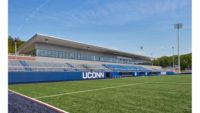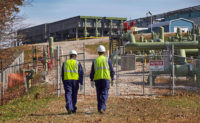John R. Lawson II doubled down on his most important duty as W.M. Jordan Co.’s chief executive: succession planning. Spending the last several years grooming future leaders at the Newport News. Va.-based firm, the 66-year-old Lawson didn’t just prep potential top executives from the next generation, but also employees from the one after that. “We’re training two generations simultaneously,” says Lawson, who just relinquished the president and CEO title he assumed 32 years ago.
On Aug. 6, W.M. Jordan named Ronald J. Lauster Jr. president and James C. Burnett chief financial officer. The company says it will announce additional promotions early this fall, noting that appointees from what Lawson sees as the third generation of the firm will serve 15 years maximum while the fourth generation is honed. “I want them to know they are going to be the leaders of the fourth generation and that I’m going to provide ownership opportunities for them,” Lawson says.
The changes not only come during Jordan’s 60th anniversary, but four months after co-founder Robert T. Lawson died at the age of 91. After buying out William Jordan, the other co-founder, in 1985, the Lawsons transformed the firm from a local general contractor into a regional construction manager that is ranked No. 175 on ENR’s 2018 Top 400 Contractors list, with $492.6 million in revenue. That’s up from $396.7 million the previous year, when the firm ranked No. 207.
In 2017, Jordan earned $409.07 million in regional revenue, a 17% increase from the previous year. This year, the firm placed 19th on ENR MidAtlantic’s Top Contractors ranking for the second straight year. The contractor employs 286 across two MidAtlantic offices.
The firm ditched traditional strategic planning and annual performance reviews years ago because it believes they create top-down management. The company also doesn’t believe in micromanaging how employees work or how they spend their time. Employees are free to enjoy on-campus fitness centers and an organic garden during business hours. Lawson believes these amenities offer employees the opportunity to be healthy while also building engagement and camaraderie.
The firm’s 0.68 experience modification rate for 2018 will be effective Sept. 30. The firm also gives to more than 200 charities each year and maintains long-term involvement with the United Way, Salvation Army, An Achievable Dream Academy and ACE Mentoring. Additionally, since 1990, W.M. Jordan has raised more than $2.5 million for Children’s Hospital of The King’s Daughters through its charity golf tournament that hosts more than 400 players.
These accomplishments, and many more, have earned W.M. Jordan recognition as ENR MidAtlantic’s Contractor of the Year.
Article Index:
Profitable Development
W.M. Jordan has remained profitable every year since its founding in 1958, including during the recession a decade ago. At the start of the downturn, Lawson pulled his firm out of all condominium work after being unnerved by his service on a bank-loan committee, where he saw doctors and lawyers “flipping condos and developing subdivisions.”
Aside from avoiding the housing-market collapse, Lawson also correctly bet that the commodities market would sink. He refused to lock in material prices with subcontractors on federal design-build contracts.
The firm had no layoffs or staff reductions and had no reduction in pay or benefits during the recession. The firm supplemented its construction income during the recession by purchasing large income-producing properties at discounted prices. Jordan remains diversified today, netting one-third of its profits from non-construction-related activities such as investments in hotels and office buildings built by the firm.
For example, W.M. Jordan Development Co. is co-developing a mixed-use project focused on medical, science and tech startups called Building One @ Tech Center. The 80,000-sq-ft building, projected to finish this fall, is the first of 11 buildings at a 50-acre Newport News research park adjacent to the Thomas Jefferson National Accelerator Facility
The project is also near the NASA Langley Research Center, where Jordan is building the $99-million Measurement Systems Lab. The 175,000-sq-ft facility will include clean rooms, electromagnetic and radio-frequency shielded rooms, conference spaces and data centers. The project is scheduled to be delivered in the spring.
Hokie Nation
The Tech Center is being developed with support from Lawson’s alma mater, Virginia Tech. In 2006, Lawson—together with Ross Myers, CEO of Worcester, Pa.-based contractor Allan Myers—helped endow VT’s Myers-Lawson School of Construction, which will be expanded by hundreds of students after the university builds its Intelligent Infrastructure and Construction Complex. The project is being put out to bid this fall and includes two new buildings and a smart dining facility.
“[W.M. Jordan has] never been late on a project; in fact, most projects have finished early.”
– Sherwood Wilson, Vice President for Operations, Virginia Tech.
Jordan declined to say if it will pursue the project. The firm didn’t compete for work at VT until after Lawson’s last term on the school’s board of visitors ended in 2010. Jordan has since been awarded six of the school’s projects worth more than $135 million combined. “They’ve never been late on a project; in fact, most projects have finished early,” says Sherwood Wilson, VT’s vice president for operations.
Currently, Jordan is in preconstruction on the $56-million Holden Hall renovation. Construction on the 21,000-sq-ft renovation and an 81,000-sq-ft addition is expected to start in May 2019.
Wilson says Jordan’s campus projects become living laboratories that let students see the concepts their professors teach in real time. Many VT students intern and work for the firm. Jordan currently has 49 Virginia Tech graduates as full-time employees, 21 of whom came through the firm’s intern program. This year, 12 of the firm’s 28 interns attend Virginia Tech.
Corporate Wellness
In his new executive chairman role, Lawson plans to focus on “crazy ideas I dream up that nobody understands until I’ve done it.” For example, Lawson abandoned traditional strategic planning and annual performance reviews in the 1990s in favor of a strategy of “continual improvement” in which the firm aims to “do better every single day than you did the day before.”
Lawson says strategic planning sets “impure mercenary goals” tied to profits and revenue. “People don’t want to dedicate their ambitions, their work and their creativity to a numbers game,” he says. Similarly, Lawson says annual reviews don’t cater to millennials’ work style. “They want daily reviews, to know how they’re doing all the time,” Lawson says.
The firm says it provides employees with “structure and discipline” without dictating how they do their work. “We pose questions for consideration and allow staff to respond with their own creative ideas,” the firm says. Geoff Bean, virtual construction coordinator at Jordan, says having latitude to make “high-level” decisions on the company’s behalf “makes you feel like you own it; it gives you skin in the game.”
Lawson says his most creative ideas come to him while he’s exercising. That’s why he launched the firm’s wellness program about six years ago. He hired his personal trainer, Julie Dixon, as the firm’s wellness director and built a 1,860-sq-ft gym in an old bank building on the firm’s Newport News campus. The program includes a full slate of exercise classes and a 34,332-sq-ft organic garden with fresh fruits and vegetables for employees and their families. The garden includes 33 raised planter beds, each with an approximately 5-ft by 20-ft planting area. The firm also built gyms in the Richmond and Wilmington, N.C., offices.
Approximately 80% of employees participate in the program, and Dixon says they are happier and more engaged. She says they encourage each other to attend workouts, walk the jobsite and avoid soda. “People are more productive, she says. “They are sick a lot less.”
Lawson says the wellness program has helped lower the cost of the firm’s self-insured group health plan four out of the last five years. But he contends that the program’s biggest benefit is teambuilding. He says camaraderie created in the gym naturally spills into the field. And, he adds, 90% of a project’s value comes from the first 10% of the effort put into a project “building your team in preconstruction.”
Life Cycles
W.M. Jordan’s 60th year has not only brought big changes for the firm, but for Lawson personally. In a two-month span, he eulogized his father; Virginia Tech’s president emeritus, Charles Steger Jr.; and his best friend, Bo Waddill, who handled Jordan’s insurance bonding.
Despite his losses, Lawson says he lives in the moment. “It’s not all about the future,” he says. Nevertheless, he spent six years working on his succession plan. The process involved enrolling several third-generation executives in high-level leadership training programs at Stanford, Harvard and the Wharton School of Business while several fourth-generation leaders attended the Field’s Management Institute. Lauster, W.M. Jordan’s new president, says his Harvard program helped him “take a hard look at myself” and “determine my strengths and weaknesses.”
Lauster says he’s “not trying to be John Lawson,” whom ENR MidAtlantic named as its inaugural Legacy Award winner in 2014, but will instead use his own “talents and abilities to build on [Lawson’s] success as we move into the future.”
While Lauster represents the firm’s first president from outside the firm’s two founding families, two of Lawson’s three children spent the summer interning at the firm. They might work at the firm one day. But Lawson—who turned down a lucrative job with a Dallas oil company after graduating college to work on crews in the field for Jordan—says his children will have to make their own decision like he did. “If it doesn’t happen naturally,” he says, “it doesn’t usually last.”







Post a comment to this article
Report Abusive Comment